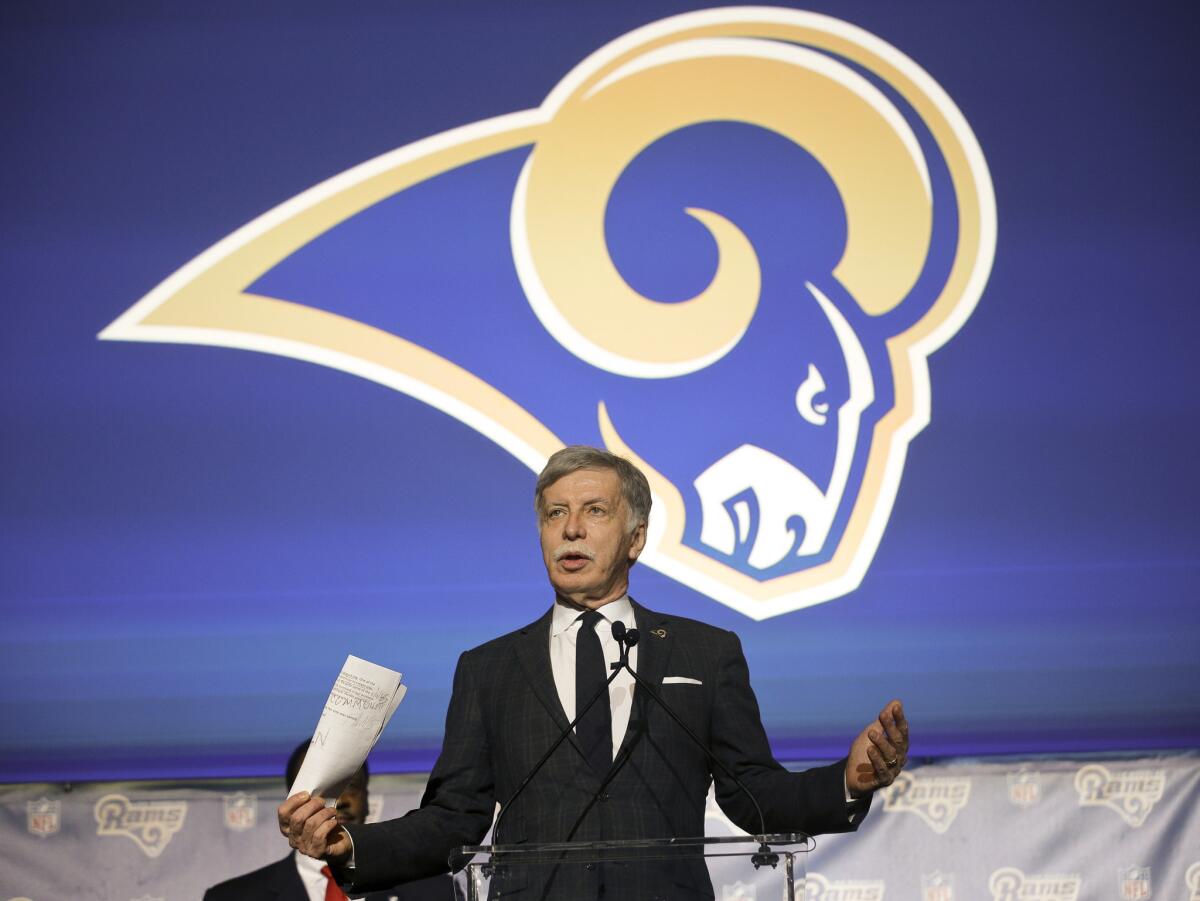Op-Ed: What Rams football will and won’t bring to L.A.

St. Louis Rams owner Stan Kroenke takes questions from the media at a news conference at The Forum in Inglewood on Jan. 15.
- Share via
The late bookie Jimmy the Greek once said that no event involving human beings has odds longer than 20-1. Upsets can always happen. For the Rams, a lawsuit, an environmental impact report or even LAX flight path issues could still imperil their return to Los Angeles.
But this deal looks virtually certain to go through. Rams owner Stan Kroenke has a huge amount at stake in his development of the former Hollywood Park racetrack in Inglewood. Likewise, Inglewood officials are thrilled that the city isn’t shelling out direct taxpayer subsidies to get an NFL team.
Public subsidies for stadiums face stiff resistance in the current political environment, as evidenced by the earlier failures of the proposals to renovate the Rose Bowl for pro football and to build a downtown stadium. Consequently, sports teams now negotiate to get development rights to the surrounding area where public subsidies are indirect: mostly infrastructure investments and tax exemptions.
One settled issue in economics is that a professional football team produces no measurable benefit to the local economy.
Kroenke’s deal for the Rams is the new champion among ancillary development rights associated with sports facilities. The plan calls for 2,500 residential units, a shopping mall, office buildings, a hotel and an upgraded casino — all abutting a lake and waterfall.
This will be a revenue driver for Kroenke. But the stadium alone is expected to cost nearly $2 billion, making it the most expensive sports facility ever built. Can he make it pay off?
Second, Southern California is flush with wealthy people who can shell out tens of thousands for a personal seat license that secures the right to buy season tickets. The legitimate question is not whether the NFL can succeed in L.A., but why the league waited so long to take advantage of the opportunity.
That said, the NFL’s bonanza will not be an economic windfall to the L.A. metropolitan area. When cities battle to attract or retain a pro sports franchise, proponents frequently claim that a team will provide massive economic benefits — more jobs, new corporate headquarters, higher incomes, greater tax revenues. But it’s just not so. One settled issue in economics is that a professional football team produces no measurable benefit to the local economy.
NFL teams just are not big businesses. Stadiums employ fewer than 100 people full time, and a few hundred more who work less than 100 hours per year. Most of a team’s payroll goes to a small number of players, coaches and executives, who often don’t even live nearby. By comparison, a single Macy’s department store employs about 200 people.
NFL stadiums also aren’t magnets for commercial development. Bars, restaurants and retail shops do not locate near a facility that is rarely occupied. Ten NFL games, a few concerts and tractor pulls, and Sunday flea markets are not the stuff of which thriving local retail centers are made.
The design of modern stadiums actually worsens this problem. Their massive concession areas and sea of parking lots minimize spill-over foot traffic from ticket-holders. Kroenke’s retail and office development at Hollywood Park will, if anything, be weakened by the presence of a football stadium and its related traffic congestion.
Adding a second team to the stadium changes that equation very little for either Inglewood or the Rams. The NFL owners have given the Chargers an option to leave San Diego to become tenants in the Rams stadium, and talks already are underway.
See more of our top stories on Facebook >>
The Los Angeles market is certainly big and rich enough to support two teams, and spreading the cost of building a modern NFL stadium over two teams makes sense. Still, as a business, a team prefers to have complete control of its stadium so that it can get a cut of the revenue from any other events held there. It also prefers not to have a direct competitor for fans, especially one playing the same sport in the same place.
If the Chargers come to town, the prices the Rams can charge for tickets, luxury boxes and personal seat licenses will have to drop a bit. The Rams probably will then seek compensation from the Chargers in high rent or control of some revenue sources from Chargers games. Add that to the $500 million the Chargers would have to pay the NFL to relocate in Los Angeles, and that deal has very long odds.
Expect the Chargers to stay in San Diego. If they move, its more plausible that they’ll end up in San Antonio or Las Vegas. Or even St. Louis.
As for what to expect from the Rams? Los Angeles shouldn’t anticipate a boom in job creation or real estate development. Turn your hopes instead to getting tickets — and a winning season.
Roger G. Noll is professor emeritus of economics at Stanford University.
Follow the Opinion section on Twitter @latimesopinion and Facebook
ALSO
San Francisco just learned the cost of doing the NFL a favor
Rams heat up Inglewood’s real estate market
Plaschke: The San Diego Chargers should stay right where they are
More to Read
A cure for the common opinion
Get thought-provoking perspectives with our weekly newsletter.
You may occasionally receive promotional content from the Los Angeles Times.










